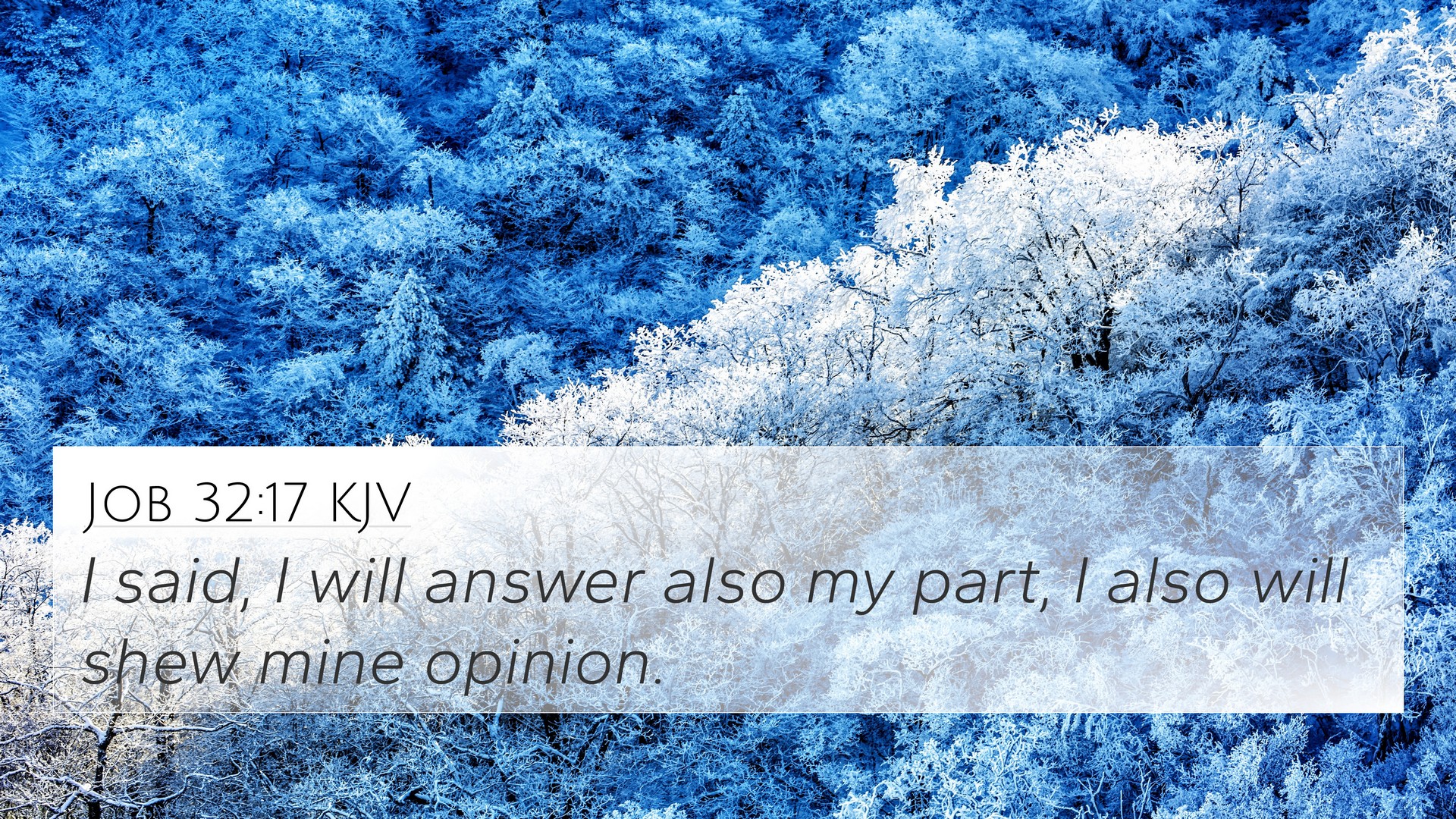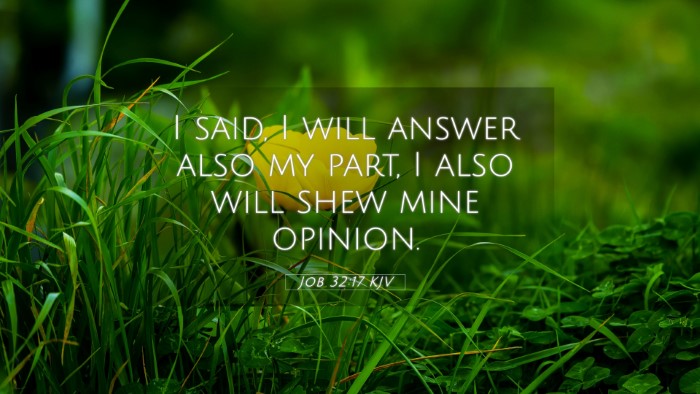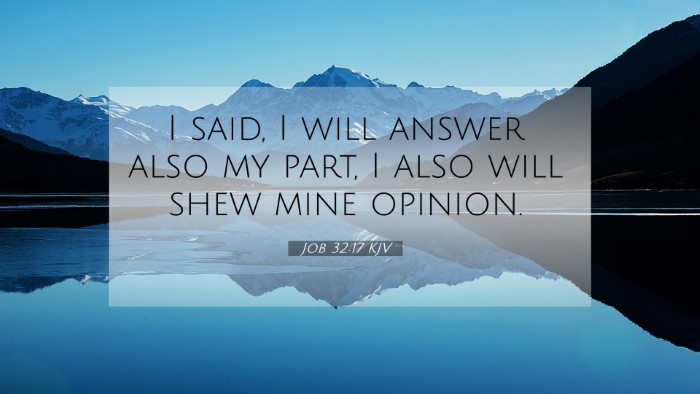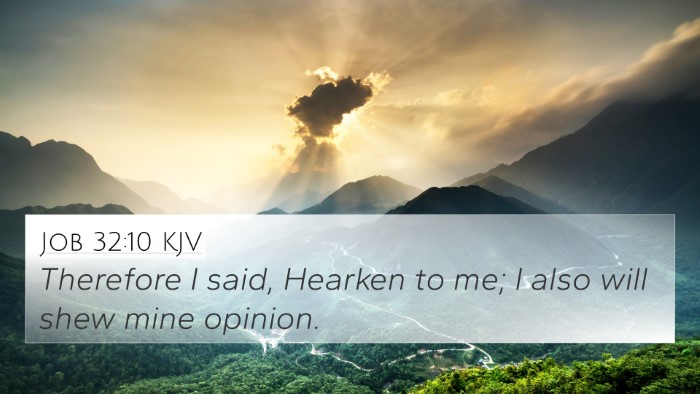Old Testament
Genesis Exodus Leviticus Numbers Deuteronomy Joshua Judges Ruth 1 Samuel 2 Samuel 1 Kings 2 Kings 1 Chronicles 2 Chronicles Ezra Nehemiah Esther Job Psalms Proverbs Ecclesiastes Song of Solomon Isaiah Jeremiah Lamentations Ezekiel Daniel Hosea Joel Amos Obadiah Jonah Micah Nahum Habakkuk Zephaniah Haggai Zechariah MalachiJob 32:17 Similar Verses
Job 32:17 Cross References
I said, I will answer also my part, I also will shew mine opinion.
Uncover the Rich Themes and Topics of This Bible Verse
Listed below are the Bible themes associated with Job 32:17. We invite you to explore each theme to gain deeper insights into the Scriptures.
Job 32:17 Cross Reference Verses
This section features a detailed cross-reference designed to enrich your understanding of the Scriptures. Below, you will find carefully selected verses that echo the themes and teachings related to Job 32:17 KJV. Click on any image to explore detailed analyses of related Bible verses and uncover deeper theological insights.

Job 33:12 (KJV) »
Behold, in this thou art not just: I will answer thee, that God is greater than man.
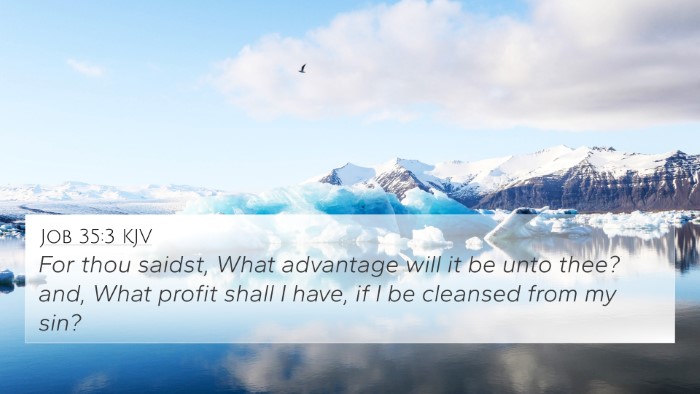
Job 35:3 (KJV) »
For thou saidst, What advantage will it be unto thee? and, What profit shall I have, if I be cleansed from my sin?
Job 32:17 Verse Analysis and Similar Verses
Understanding Job 32:17
Job 32:17 states: "I too will declare my opinion; I too will share my knowledge." This verse is significant in the context of the dialogue between Job and his friends, as it heralds the entry of Elihu, a younger observer who feels compelled to share his insights after listening to the discussion. The introduction of Elihu provides a pivotal moment in the Book of Job, emphasizing the importance of wisdom and the sharing of perspectives.
Commentary Insights
The verse reflects a key idea emphasized by many public domain commentators:
- Matthew Henry: Henry highlights the necessity of sharing knowledge and understanding, noting that Elihu felt it was his duty, as a younger voice, to contribute to the conversation. He stresses that silence in the face of wisdom is a disservice to all.
- Albert Barnes: Barnes points out Elihu’s respectful approach, recognizing the wisdom of the elders before him, but he insists on the value of his contribution. Barnes emphasizes that youth is not a barrier to wisdom.
- Adam Clarke: Clarke elaborates that Elihu's voice serves to represent the voice of reason amid the emotional turbulence of Job and his friends. He interprets Elihu's declaration as an expression of his eagerness to provide understanding and clarity.
Key Themes
This verse introduces several overarching themes:
- The Value of Perspective: Elihu’s readiness to share his opinion showcases the value of diverse perspectives in discourse, especially on profound matters like suffering and divine justice.
- Wisdom Across Generations: The interaction between Elihu and the older men reflects the transitions of wisdom, suggesting that age alone does not determine the possession of insight.
- Commitment to Truth: Elihu is driven by a commitment to reveal truth and wisdom, emphasizing the responsibility of believers to share insights that may lead to understanding and solace.
Cross-References
Job 32:17 can be connected with several relevant Bible verses that echo its themes:
- Proverbs 1:5: "A wise man will hear and increase learning, and a man of understanding will attain wise counsel." This verse highlights the importance of sharing knowledge.
- Proverbs 27:17: "As iron sharpens iron, so one person sharpens another." This emphasizes the benefit of constructive dialogue.
- Ecclesiastes 4:9-10: “Two are better than one, because they have a good reward for their labor. For if they fall, one will lift up his companion...” This supports the idea of collaboration and sharing wisdom.
- Job 15:2: "Should a wise man answer with empty knowledge, and fill himself with the east wind?" Here, wisdom in discourse is questioned, aligning with Elihu's motivation to contribute meaningful insight.
- Proverbs 18:13: "He who answers a matter before he hears it, it is folly and shame to him." Elihu’s previous patience in listening reflects this principle.
- James 1:19: "So then, my beloved brethren, let every man be swift to hear, slow to speak, slow to wrath." This echoes Elihu's approach in listening before voicing his thoughts.
- Psalms 37:30: "The mouth of the righteous speaks wisdom, and his tongue talks of justice." Elihu's intent is to declare wisdom in a moment of great need.
Conclusion
The phrase "I too will declare my opinion; I too will share my knowledge" in Job 32:17 calls to us to value contribution from all voices in matters of significance. As illustrated by the insight of commentators and reinforced by cross-referenced scriptures, the dialogue around this verse underscores the importance of mutual respect and knowledge sharing. Elihu’s willingness to speak symbolizes a broader call to engage in discourse characterized by wisdom and understanding.
